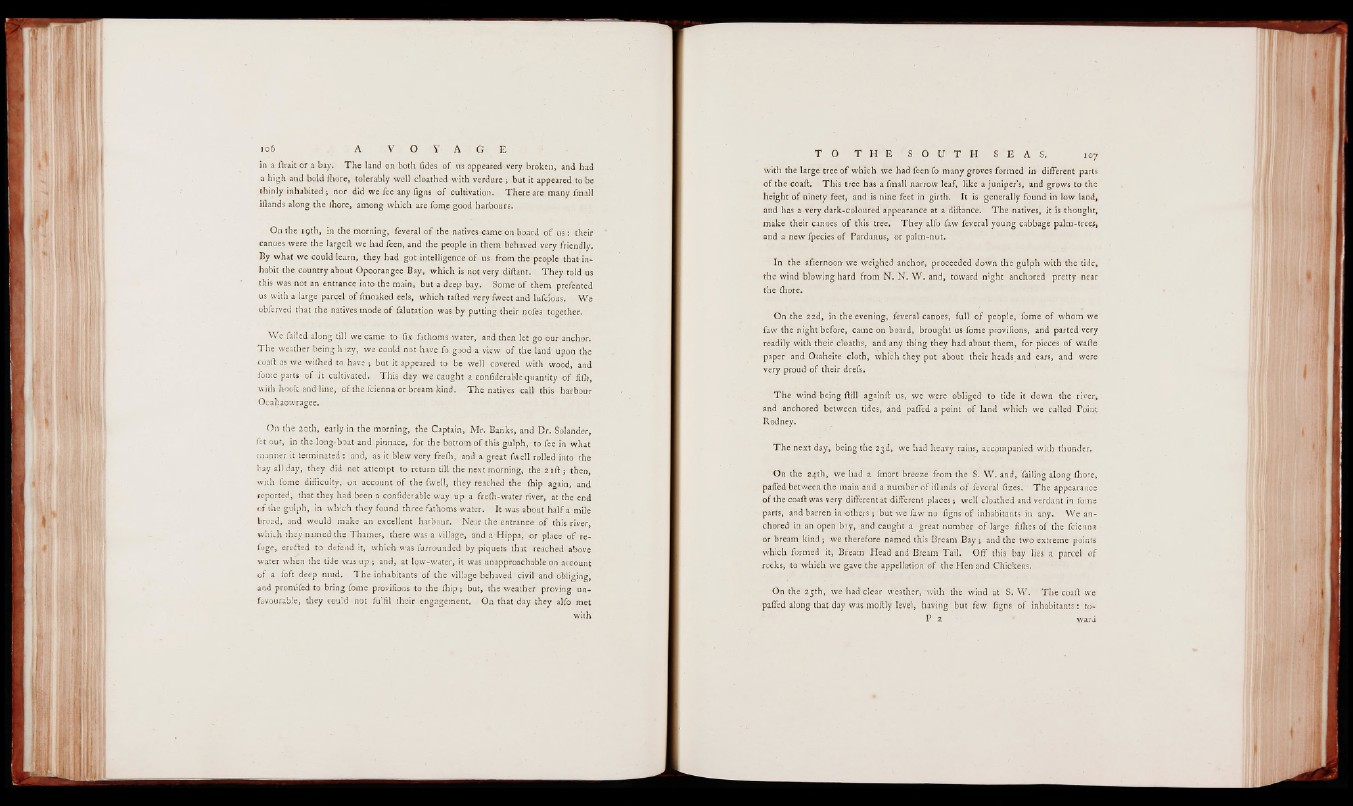
in a ftrait or a bay. The land on both fides of us appeared very broken, and had
a high and bold ihore, tolerably well cloathed with verdure ; but it appeared to be
thinly inhabited; nor did we fee any figns of cultivation. There are many fmall
iflands along the ihore, among which are fome good harbours.
On the 19th, in the morning, feyeral of the natives came on board of us : their
canoes were the largeft we had feen, and the people in them behaved very friendly.
By whaf we could learn, they had got intelligence of us from the people that inhabit
the country about Opoorangee Bay, which is not very diilant. They'told us
this was not an entrance into the main, but a deep bay. Some of them prefented
us with a large parcel of fmoaked eels, which tailed very fweet and lufcfous. We
obferyed that the natives mode of falutation was by putting their nofes together.
We failed along till we came to. fix fathoms water, and then let go our anchor.
The weather being h^zy, we could not have fo.gpod a view of the land upon the
coail as we wiihed to have ; but it appeared to be well covered with wood,, and
fome parts of it cultivated. This day we caught a confiderable quantity of fiib,
with hook and line, of the fcienna or bream kind. The natives call .this harbour
Ooahaowragee.
On the 20th, early in the morning, the Captain, Mr. Banks, and Dr. Solander,
fet out, in the long-boat and pinnace, for the bottom of this gulph, to fee in what
manner it terminated: and, as it blew very freih, and a great fwell rolled into the
bay all day, they did not attempt to return till the next morning, the 21ft ; then,
with fome difficulty, on account of the fwell, they reached the ihip again, and
reported, that they had been a confiderable way up a frefh-water river, at the end
of the gulph, in which they found three fathoms water. It was about half a mile
broad, and would make an excellent harbour. Near the entrance of this river,
which they named the Thames, there was a village, and a Hippa, or place of refuge,
eredted to defend it, which was furrounded by piquets that reached above
water when the tide was up ; and, at Iqw-water, it was unapproachable on account
o f a foft deep mud. The inhabitants of the village behaved civil and obliging,
and promifed to bring fome proviiions to the ihip j but, the weather proving unfavourable,
they could not fulfil their engagement. On that day they alfo met
with
T O T H E S O U T H S E A S . 107
with the large tree of which we had feen fo many groves formed in different parts
of the Coail. This tree has a fmall narrow leaf, like a juniper’s, and grows to the
height of ninety feet, and is nine feet in girth. It is generally found in low land,
and has a very dark-coloured appearance at a diflance. The natives, it is thought,
make their canoes of this tree. They alfo faw fevcral young cabbage palm-tree^,
and a new fpecies of Pardanus, or palm-nut.
In the afternoon- we weighed anchor, proceeded down the gulph with the tide,
the wind blowing hard from N. N. W. and, toward night anchored pretty near
the ihore.
On the 22d, in the evening, feveral canoes, full of people, fome of whom we
faw the night before, came on board, brought us fome proviiions, and parted very
readily with their cloaths, and any thing they had about them, for pieces of waile
paper and Otaheite cloth, which they put about their heads and ears, and were
very proud of their drefs.
The wind being ilill againit us, we were obliged to tide it down the river,
and anchored between tides, and pafied a point of land which we called Point
Rodney.
The next day, being the 23d, we had heavy rains, accompanied with thunder.
On the 24th, we had a fmart breeze from the S. W. and, failing along ihore,
pafied between the main and a number of iflands of feyeral fizes. The appearance
of the coail was very different at different places; well cloathed and verdant in fome
parts, and barren in »others; but we faw no figns-'of inhabitants in any. We anchored
in an open bay, -and caught a great number of large fiihes of the fcienna
or bream kind; we therefore named this Bream Bay; and the two extreme points
which formed it, Bream Head and Bream Tail. Off this bay lies a parcel of
rocks, to which we gave the appellation of the Hen and Chickens.
On the 25th, we had clear weather, with the wind at S. W. The coail we
patTed along that day was moftly level, having but few figns of inhabitants : toll
2 0 ward